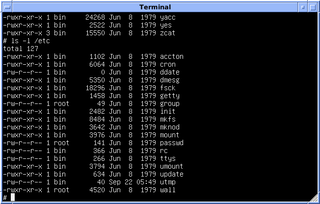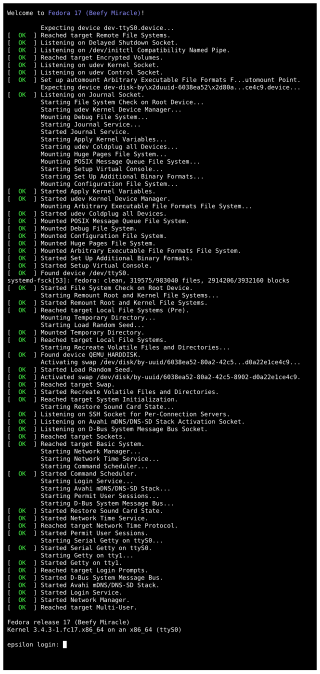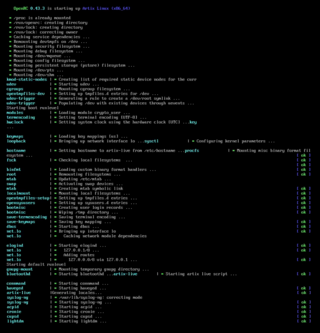Related Research Articles
In Internet computing, NSD is an open-source Domain Name System (DNS) server. It was developed by NLnet Labs of Amsterdam in cooperation with the RIPE NCC, from scratch as an authoritative name server. The intention of this development is to add variance to the "gene pool" of DNS implementations used by higher level name servers and thus increase the resilience of DNS against software flaws or exploits.

In multitasking computer operating systems, a daemon is a computer program that runs as a background process, rather than being under the direct control of an interactive user. Traditionally, the process names of a daemon end with the letter d, for clarification that the process is in fact a daemon, and for differentiation between a daemon and a normal computer program. For example, syslogd is a daemon that implements system logging facility, and sshd is a daemon that serves incoming SSH connections.

In Unix-based computer operating systems, init is the first process started during booting of the operating system. Init is a daemon process that continues running until the system is shut down. It is the direct or indirect ancestor of all other processes and automatically adopts all orphaned processes. Init is started by the kernel during the booting process; a kernel panic will occur if the kernel is unable to start it, or it should die for any reason. Init is typically assigned process identifier 1.
Link prefetching allows web browsers to pre-load resources. This speeds up both the loading and rendering of web pages. Prefetching was first introduced in HTML5.
launchd is an init and operating system service management daemon created by Apple Inc. as part of macOS to replace its BSD-style init and SystemStarter. There have been efforts to port launchd to FreeBSD and derived systems.
Fontconfig is a free software program library designed to provide configuration, enumeration and substitution of fonts to other programs. Fontconfig was originally written and maintained by Keith Packard, and is currently maintained by Behdad Esfahbod.
RSS enclosures are a way of attaching multimedia content to RSS feeds by providing the URL of a file associated with an entry, such as an MP3 file to a music recommendation or a photo to a diary entry. Unlike e-mail attachments, enclosures are merely hyperlinks to files. The actual file data is not embedded into the feed. Support and implementation among aggregators varies: if the software understands the specified file format, it may automatically download and display the content, otherwise provide a link to it or silently ignore it.
In computing, a dynamic linker is the part of an operating system that loads and links the shared libraries needed by an executable when it is executed, by copying the content of libraries from persistent storage to RAM, filling jump tables and relocating pointers. The specific operating system and executable format determine how the dynamic linker functions and how it is implemented.
The Prefetcher is a component of Microsoft Windows which was introduced in Windows XP. It is a component of the Memory Manager that can speed up the Windows boot process and shorten the amount of time it takes to start up programs. It accomplishes this by caching files that are needed by an application to RAM as the application is launched, thus consolidating disk reads and reducing disk seeks. This feature was covered by US patent 6,633,968.

In mathematics and its applications, the signed distance function is the orthogonal distance of a given point x to the boundary of a set Ω in a metric space, with the sign determined by whether or not x is in the interior of Ω. The function has positive values at points x inside Ω, it decreases in value as x approaches the boundary of Ω where the signed distance function is zero, and it takes negative values outside of Ω. However, the alternative convention is also sometimes taken instead.
Preload may refer to:
FarsiTeX is a free Persian/English bidirectional typesetting system based on the TeX system. The FarsiTeX project was initiated by Mohammad Ghodsi at Sharif University of Technology in 1993.
The multi-stage booting process of Linux is in many ways similar to the BSD and other Unix-style boot processes, from which it derives.
HarfBuzz is a software development library for text shaping, which is the process of converting Unicode text to glyph indices and positions. The newer version, New HarfBuzz (2012–), targets various font technologies while the first version, Old HarfBuzz (2006–2012), targeted only OpenType fonts.
Readahead is a system call of the Linux kernel that loads a file's contents into the page cache. This prefetches the file so that when it is subsequently accessed, its contents are read from the main memory (RAM) rather than from a hard disk drive (HDD), resulting in much lower file access latencies.

systemd is a software suite that provides an array of system components for Linux operating systems. The main aim is to unify service configuration and behavior across Linux distributions. Its primary component is a "system and service manager" – an init system used to bootstrap user space and manage user processes. It also provides replacements for various daemons and utilities, including device management, login management, network connection management, and event logging. The name systemd adheres to the Unix convention of naming daemons by appending the letter d. It also plays on the term "System D", which refers to a person's ability to adapt quickly and improvise to solve problems.

DAEMON Tools is a virtual drive and optical disc authoring program for Microsoft Windows and Mac OS.

OpenRC is a dependency-based init system for Unix-like computer operating systems. It was created by Roy Marples, a NetBSD developer who was also active in the Gentoo project. It became more broadly adopted as an init system outside of Gentoo following the decision by some Linux distributions not to adopt systemd.
Docker is a set of platform as a service (PaaS) products that use OS-level virtualization to deliver software in packages called containers. The service has both free and premium tiers. The software that hosts the containers is called Docker Engine. It was first released in 2013 and is developed by Docker, Inc.

Seyed Behdad Esfahbod MirHosseinZadeh Sarabi is an Iranian-Canadian software engineer and free software developer. He was a software engineer at Facebook from February 2019 until July 1st, 2020; before that he was a Senior Staff Software Engineer at Google since 2010, and before that at Red Hat.